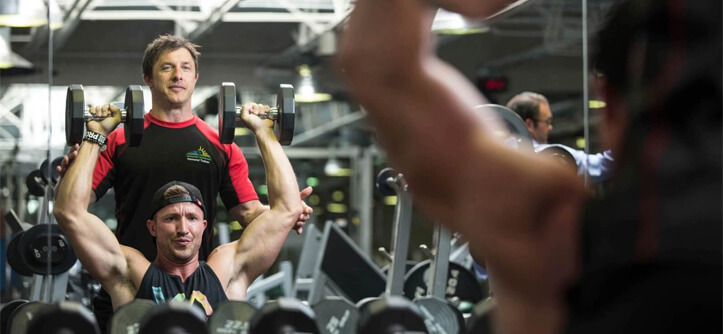How to become a personal trainer is one of the most frequently asked questions in recent times. The growth of the fitness industry, accompanied by a growing demand for good professionals, is forcing many fans of a healthy lifestyle to look for ways to get involved in such a rapidly growing market. And it is this extremely relevant topic that we will consider in this article.
This material is a logical continuation of the first part of a series of articles about what the work of a fitness trainer is like. In the first part, we analyzed the very concept of a coach, considered the career opportunities that are open to him, and also learned about the requirements for a potential fitness trainer by an employer. In the same part, the second in a row, we will try to lift the veil over the process of finding and employment in a fitness club, as well as touch on many ins and outs of the nuances, of which, believe me, there are plenty in this profession. Also get ready for the fact that in this article we will debunk many myths that exist among the uninitiated.
Imagine that you wondered how to become a personal trainer from scratch and set yourself the goal of getting a job as a trainer. The first question that will arise in your head is what is needed for this? Under this rather general question lies many smaller and more specific ones, such as: what education you need to have, what knowledge you need to have, what experience you need, what diplomas or certificates you need, and so on and so forth. Well, let's try to answer these questions in order, however, not only these, but also many others.
Experience in the gym
The first thing you need to know before you set out to look for a job is experience. And I don’t mean the experience of working as a coach, which you naturally don’t have yet. I mean the experience of self-training in the gym, so that you understand how the club works, how the staff works, how the training process goes, what kind of simulators there are, what they are for and how to work on them. Experience shows that it will be quite enough for you to work out on your own from 6 to 12 months in order to master at least a basic concept of how the club works and functions. During this time, it is desirable to follow the work of trainers, how they look, how they behave, how they communicate, how they train clients and how they train themselves, if they train at all. This will be a great help to you in your quest to become a personal fitness trainer.
MYTH. The vast majority of people believe that a coach should be a pumped-up bighead. So, clients are often completely indifferent to how the coach looks (but of course, he should not look ugly). They come to get the desired result with it. Who will give them this result is practically irrelevant for them. Your knowledge is important - how you will give the client what he wants from you. If a thin coach has this knowledge, but a big and beefy guy does not, then the client will certainly turn not to the form, but to the content. And this is not a theory, but a real experience. Moreover, experience even shows the opposite - the stereotypical thinking of people makes them think that a huge bodybuilder will definitely make them the same, and in fact, not all men want to become big, and even more so women do not want it. Therefore, it also happens that a massive appearance can push the client away from the coach. And this is also a real experience.
Experience with a trainer

The second thing that will play into your hands is at least a short experience of training with an experienced person in this craft, which may be your friend, relative or acquaintance, but it is better if these are joint trainings with an already working coach. From him you can get the necessary information about the basic principles of building training, about the basics of proper nutrition, about various sports supplements and their use, however, not only. Such a person will most likely help with questions regarding how to become a personal trainer in the gym. By training on your own and absorbing knowledge from an experienced coach, at this stage you can best understand for yourself, firstly, most of the aspects of the training process, secondly, the features of working as a coach, and thirdly, are you interested in this profession at all.
ADVICE. Keep in mind that training yourself and training others are two very different things. If you are doing it yourself, you like it and it seems simple and fun, think about the fact that you are essentially training only one person, that is, yourself. As a coach, you will be visited by dozens, hundreds and even thousands of people of different ages, with different goals, different levels of training, different characters, with or without injuries, with or without experience, with mental disorders, physical disabilities, vestibular disorders, musculoskeletal system, etc. Everyone will have to find an individual approach, everyone will have to draw up a personal training program and a personal nutrition plan. Before taking any action, think about whether you need this hassle at all.
How to master knowledge
 So, in order to become a personal fitness trainer, you need to properly learn this craft. And you have two ways to develop at the initial stage: learn from an experienced coach (which we just reviewed), or complete the appropriate training courses. When applying for a job, in the first case it will be more difficult for you to prove your knowledge, since there will be no supporting document behind them. You were just taught by a friend. You will either prove how accurate and relevant his knowledge is at the interview, or, if circumstances are successful, in the first months of work. In the second case, you are more likely to get a job, since the level of your qualification is confirmed by a very specific document. However, as experience shows, the document is also far from an indicator of the qualifications of a future specialist, and that's what I mean.
So, in order to become a personal fitness trainer, you need to properly learn this craft. And you have two ways to develop at the initial stage: learn from an experienced coach (which we just reviewed), or complete the appropriate training courses. When applying for a job, in the first case it will be more difficult for you to prove your knowledge, since there will be no supporting document behind them. You were just taught by a friend. You will either prove how accurate and relevant his knowledge is at the interview, or, if circumstances are successful, in the first months of work. In the second case, you are more likely to get a job, since the level of your qualification is confirmed by a very specific document. However, as experience shows, the document is also far from an indicator of the qualifications of a future specialist, and that's what I mean.
AN EXPERIENCE. The rapid growth of the industry, which provokes an increase in the demand for specialists, also provokes the growth of all kinds of schools, colleges and training courses for trainers. Now almost every fitness club or every network of clubs opens training courses for trainers. Not to mention private schools that undertake to train people without being tied to a specific club. Most of these courses are aimed at making money and do not aim to provide quality knowledge, so the quality of knowledge of graduates can be easily questioned. Why it happens? Because fitness in our country does not have a legislative base, and is not regulated by specific articles of the law or the constitution, which creates fertile ground for corruption and fraud. Two people in any basement can organize their own school of trainers, give the simplest material at lectures and print pseudo-European certificates with supposedly watermarks on a color printer. And the market for such schools continues to grow. Which exit? Look for trusted and established schools and associations that have been around for many years and study there. It plays into your hands that technological progress in the era of electronics and computers allows you to study remotely, for example via Skype, and the diploma will be sent to you by mail.
MYTH. Most future potential trainers, in search of an answer to the question of how to become a personal trainer, also think that for this job you need to have a higher education in the field of physical education. In practice, if you already have such an education, this will serve as a plus for you in finding a job, otherwise, the absence of such is not at all a determining factor in finding a job. After all, the employer does not know whether you really studied all five years at a university or slept at lectures, skipped them, gave bribes at sessions and eventually received a diploma of higher education. The employer understands this, and therefore does not consider the presence or absence of college education to be mandatory. It is only a “nice bonus”, which, according to the announcements, is higher pedagogical and medical education. Such candidates have an advantage over the rest. In general, it is important for the employer to see not a specific university education, it is important for him to see the very fact that you have it. Which in turn suggests that you have the makings of a socially active person.
The question of the relevance of age is also not decisive. If you want to officially work as a trainer, all that limits you in this case is the age limits described in the labor laws of your country. In different countries, often 16 or 18 years old is the age at which you can officially be hired. It is quite natural that at this age you do not have a higher education. How to become a personal trainer in this case? There is a way out: take training courses at a vocational school. This is entirely up to you.
Sports experience

The third factor that plays into your hands is the experience of playing sports. Why? Everything is very simple. A person involved in or involved in sports, objectively knows more than others about what the training process is and how it is built. What is the regimen and proper nutrition. What is motivation, goal setting and hard work to achieve it. In other words, even a cyclist, skier or swimmer who wants to become a personal fitness trainer will have a better chance of getting a job than someone who has never played sports. Even if you are 30, 40 or 50 years old and you can no longer boast of an athletic physique, the very knowledge and experience of playing sports will definitely play into your hands.
MYTH. Often there is also such a question: should a potential coach have experience in performing at bodybuilding competitions (including mens physicist, fitness bikini, etc.)? Absolutely not necessary. Once again, the client comes to the club to get the result. Who will give him this result for him practically does not matter. The presence of performance experience and medals will certainly play into your hands, but in practice it is not a determining factor either when applying for a job or when a client chooses between a coach with and without competitive experience. As I said above, the fact that a person was able to prepare himself does not at all guarantee that he will be able to prepare someone else.
Communication experience

The fourth factor is the experience of working with people. Better yet, experience in sales. Communication plays an important role in coaching. A potential coach absolutely must be open, sociable and sociable and definitely should not be shy and withdrawn. Also in the work of a coach it is very important to be able to advertise and sell yourself. More specifically, your services. You will have to convince people every day and constantly that you are the person who will lead them to the result in the shortest possible time. That you are better than other coaches, that you know more, you have more experience, you are better versed in nutrition, for example, or only you have experience with back injuries, or only you have successfully prepared athletes for competitions. Communication is the greatest art that can only be learned through practice.
So, an intermediate conclusion and conclusion on how to become a personal trainer in the gym. When applying for a job, five factors will play into your hands: 1) A university diploma or certificate of completion of training courses for trainers; 2) Experience of independent training; 3) Experience with an experienced trainer; 4) Experience in any sport; 5) Experience in sales. This is already quite a lot to qualify for the position of a fitness trainer.
Conclusion
Summarizing this material, it is worth saying that the intention to become a coach must be supported not only by desire, but also by action to constantly develop. Read, learn, participate in professional events, thus increasing their level of knowledge and skills. As we have already found out, you will have to work with hundreds of different clients with different goals and initial health conditions, and only someone who constantly devotes time to self-development can cope with such a difficult task. Working as a fitness trainer is more teaching than sport, for this very reason, knowledge and the ability to work with people are more valued here than sculpted bodies and competition medals.
Against this background, we will debunk a couple more myths and move on to the third part of a series of articles about the difficult profession of a coach and how to become a personal trainer from scratch.
MYTH. A performing athlete in a fitness coaching job is a more effective employee than a non-performing trainer with a physique typical of the average person. We have already talked about this, but you can look at this issue in a different way. If a performing athlete cannot connect two words, even if his knowledge was great, then he is worthless in working with clients. He will not earn money and will not be valued by management. At the same time, the same performing athlete with a well-spoken tongue and high communication skills will easily lure clients to his training and “chopping cabbage”. In other words, as you already understood, and as I said above, the work of a fitness trainer is specific in that it is communication skills that play a significant role here, and not titles and titles. A performing athlete is not always a good methodologist.
MYTH. From here you can also deduce another myth that you may have heard about many times - that pitching is stupid. This is certainly not true, since everything depends on each individual person. Often, it's quite the opposite. In order to achieve significant results in bodybuilding, you need to keep a lot of information in your head. What is the glycemic index, nitrogen balance, how many grams of protein per kilogram of weight should be consumed to increase muscle mass, how to vary the training program depending on changing goals, how the process of supercompensation proceeds, etc. Such a person, as a rule, understands all exercises and technique. He knows what sports supplements are for, what glucosamine, chondroitin and methylsulfonylmethane are. Knows how to calculate the calorie content of the diet, taking into account the rate of consumption of proteins, fats and carbohydrates. He has knowledge in the field of anatomy, physiology, biochemistry and more. Sometimes, a bodybuilder, not even necessarily a professional, is a walking encyclopedia of bodybuilding. To call such a person stupid is highly incorrect.
